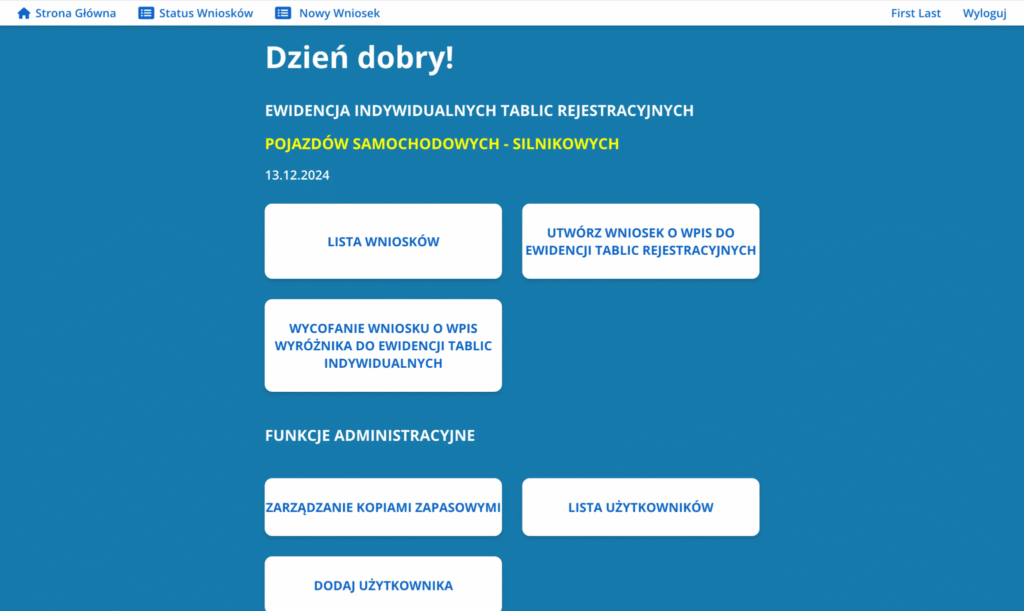Individual license plates – how are digital systems changing the face of public administration?
Mayeryn
19 March 2024 • 14 min
The digitization of public administration is a process that has gathered tremendous momentum in recent years. Citizens increasingly expect government services to be as easily and transparently accessible as online banking or shopping. In this context, the electronic management of individual license plates is a particularly interesting area.
While this may seem like a niche service, in practice it demonstrates how much the administration can gain by implementing modern IT tools—and how much it loses if such tools are lacking.
Traditional model – barriers and limitations
Many offices still operate based on traditional paper procedures. In the case of individual plates, this means:
- The need to manually verify the availability of the number,
- physical receipt and archiving of documents,
- the inability of citizens to easily monitor the status of their case,
- scattered databases and difficulties with reporting.
This approach has several serious consequences:
- Extended processing times – a case that could be resolved in a few days can drag on for weeks.
- Higher costs – manual processing requires engaging numerous officials in repetitive, low-value tasks.
- Higher risk of errors – typos, lost documents, or incorrectly reserved numbers.
- Low transparency – residents often feel lost and deprived of information.
- Image problems – the office appears slow and unfriendly.
At a time when citizens are accustomed to services available with a single click, maintaining such a model is becoming increasingly risky – both organizationally and in terms of image.

Digital alternative – modern service systems
A modern system for managing individual license plates allows us to completely change this image. Thanks to digitization:
- The application submission and processing process is conducted online.
- The availability of numbers is automatically checked.
- All data is stored in a single, coherent database.
- Reports and summaries are generated automatically.
- Citizens can see the status of their case in real time.
- The office can analyze trends and plan actions based on the data.
This solution not only improves the work of officials, but also significantly increases the satisfaction of residents.

Case study – Pomeranian Voivodeship
A good example of effective digitalization is the implementation of a system for managing individual license plates in Gdańsk, Gdynia, Sopot, Słupsk, and several counties in the Pomeranian Voivodeship.
The system enables:
- Electronic processing of applications for special license plates,
- processing changes to local jurisdiction,
- withdrawal of applications by citizens or offices,
- integration with the EZD system,
- export of data to other administrative systems,
- generating statistics and reports in real time.
The effects of the implementation were measurable:
- Case processing times have been shortened,
- staff workload has been reduced,
- procedures have become more transparent and predictable,
- data quality and analysis capabilities have been improved.
This shows that digitalization in this area is not a theoretical convenience, but a real tool for change.

Korzyści – spojrzenie z dwóch perspektyw
Citizen
- Fast, remote service,
- clear information about the status of the case,
- fewer office visits,
- greater trust in the administration.
Institution
- Process automation and cost reduction,
- Improved data quality,
- Easy reporting and analysis,
- Compliance with legal requirements (GDPR, digital accessibility),
- Better image of the office as a modern, efficient institution.
Why is the lack of a system a strategic risk?
Declining to implement a digital system is not a neutral decision. It means:
- Higher ongoing maintenance costs,
- resident dissatisfaction,
- risk of loss of public trust,
- difficulties in meeting digitalization and accessibility requirements,
- lack of data that can support strategic decisions.
In the long run, this is not just an organizational issue – it is a real threat to the credibility and effectiveness of the administration.

Managing individual license plates is just one example. The broader trend is clear: citizens expect digital government, transparent and accessible from their smartphones.
Cities that choose to implement modern tools gain an advantage – both operational and image-wise. This not only streamlines processes but also builds public trust.
Digital systems for managing individual license plates demonstrate that even a seemingly niche area of an office’s operations can become a testing ground for innovation. The lack of such a system poses an increasingly significant risk today – implementing one, however, is an investment in efficiency, transparency, and better relationships with residents.
The example of the Pomeranian Voivodeship confirms that digitization in this area is bringing tangible results and is an important step toward the administration of the future.
Want to learn more about the individual license plate management system implemented at the request of the Gdańsk City Hall? Visit https://mayeryn.com/en/m-projekty/individual-license-plate-management-system/
Are you interested in implementing such a system in your organization? Contact us.


